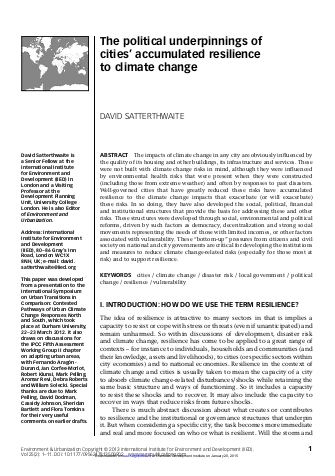
The impacts of climate change in any city are obviously influenced by the quality of its housing and other buildings, its infrastructure and services. These were not built with climate change risks in mind, although they were influenced by environmental health risks that were present when they were constructed (including those from extreme weather) and often by responses to past disasters. Well-governed cities that have greatly reduced these risks have accumulated resilience to the climate change impacts that exacerbate (or will exacerbate) these risks. In so doing, they have also developed the social, political, financial and institutional structures that provide the basis for addressing these and other risks. These structures were developed through social, environmental and political reforms, driven by such factors as democracy, decentralization and strong social movements representing the needs of those with limited incomes, or other factors associated with vulnerability. These “bottom-up” pressures from citizens and civil society on national and city governments are critical for developing the institutions and measures to reduce climate change-related risks (especially for those most at risk) and to support resilience.
Resource collections
- Climate emergency
- UN Habitat - Urban Response Collection
- Urban Response - Urban Crisis Preparedness and Risk Reduction
- Urban Response Collection - Community Engagement and Social Cohesion
- Urban Response Collection - Economic Recovery
- Urban Response Collection - Environment and Climate Change
- Urban Response Collection - Housing, Land and Property
- Urban Response Collection - Urban Crisis Response, Recovery and Reconstruction
- Urban Response Collection - Urban Resilience